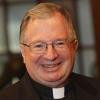On Friday, PBS NewsHour profiled the first Muslim American general manager of a major professional baseball team, Farhan Zaidi of the Los Angeles Dodgers. His ascension as the first Muslim American into the most American of sports and cultural institutions, baseball, provides a perfect example of integrating into a new country while remaining proud and living by one's cultural and religious roots and values.
The success of Zaidi, who was born to Pakistani parents in Canada and grew up in the Philippines, suggests an alternative narrative to the tales of interreligious hostility and radicalization that are so much with us these days. It comes at a time when demographers project an accelerating growth of the Muslim population worldwide.
By 2050, the world's Muslims are expected to number 2.8 billion, only slightly less than the 2.9 billion Christians of all denominations. By 2100, Muslims are expected to outnumber Christians. These are the projections of the Washington-based Pew Research Center in a study six years in the making.
By 2050, more than 10 percent of Europeans will be Muslim while in the United States, Muslims will surpass Jews as the largest non-Christian population in the U.S. Overall, many Western countries will see the share of their population that is Muslim double, and in some cases triple, over the course of just two generations.
In a perfect world, these trends would be welcomed as an addition to the rich diversity of cultures and beliefs that make up any pluralistic liberal society. In practice, it will alarm those pundits, scholars and politicians who have built a cottage industry of encouraging a clash between Islam and the West.
The growth of the Muslim population will also likely put strain on countries whose ideal of tolerance has clashed with the reality of lingering prejudice and unease toward people who are different. With jihadists singling out Christians in Kenya, Nigeria, Syria and Iraq for execution, the projected Muslim growth trend may well feed the anxieties of many otherwise tolerant families.
Rather than heightening anxiety, the Pew study should serve to spur action for Western governments and their Muslim citizens to take steps to ensure these religious and demographic changes enrich rather than divide their societies.
Instead of acceding to the wave of prejudice and discrimination, Western governments should reinforce and implement messages and policies of full equality for their Muslim immigrants and citizens while understanding that the intricate link between Muslim religion and culture requires a patient, generational process of gradual integration.
Without greater integration and economic opportunity, in Europe, at least, Western countries risk creating a Muslim social and economic underclass. In the U.S., where Muslims are better integrated and more affluent, discrimination and intergroup hostility would promote conditions that are ripe for unrest and radicalization.
Muslim citizens of Western countries and expatriate permanent residents have their own set of responsibilities to live up to. The West cannot be regarded as simply a refuge from the chaos in their mother countries, a heathen world of unbelievers, a place where they simply live in self-imposed exclusion and ghettoization.
Residence in and especially citizenship in a country has a specific set of national responsibilities required of every citizen and permanent resident, such as learning the language, respecting the culture and participating in every aspect of society, from local PTA meetings to voting in national elections. In other words, minorities have a duty to become constructive participants in their host societies.
The transformation of the Jews of Europe from their pariah status in the ghettos and shtetls of old Europe to emancipated, active citizens of their host countries provides a mode of integration of 21st-century Muslims. While the path to full inclusion was often a bumpy road, for the most part, the Jews of Western Europe and the U.S. successfully made that transformation. They found the elusive balance between remaining rooted in their centuries-old traditions and religious beliefs while assimilating into and embracing the culture, science and ideals of the developing democratic traditions of the nation states they lived in.
This transformation from a minority migrant to a full citizen of a nation who also happens to be Muslim is the critical step needed for Muslim citizens of the West to take. Muslims need not and should not sacrifice their identity as Muslims to simultaneously fully enjoy all the benefits and exercise the responsibilities citizenship offers.
Such successful integration will also serve as an antidote to the current maelstrom of extremism infecting the Middle East and Muslim world by demonstrating to Arab and Muslim youth that interaction with the West can be fruitful for both sides rather than a cause of tension and conflict.
The idea of a civilizational divide is at its root an opinion harbored by those who really know very little about Islam and have had very little contact with Muslims or with the religion of Islam. With Islam now the fastest-growing religion in the world, increased contact, communication and socializing between the two sides will be the key to a peaceful future. The LA Dodgers' Zaidi is the model for an integrated, peaceful West where a Muslim as well as a Christian or Jew can be at home.
[Jesuit Fr. Drew Christiansen is former editor of America magazine and a professor of ethics at Georgetown University. Ra'fat Aldajani is a Palestinian-American writer and commentator.]





